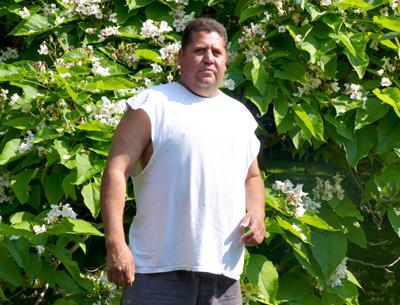Reflecting on State’s Reversal

Fred Pharaoh said he had been working in Montauk more often these days. On Monday as he added a second coat of white paint to a bedroom wall, he talked about the warm fog that descended on the ocean side of Montauk this time of year.
“I don’t know if it’s in my head, or in my blood, but I love it.” In any case, he said the drive from his home in Sag Harbor to Montauk felt like a return. He is a Montaukett Indian.
Mr. Pharaoh specializes in drywall, the application of Sheetrock, Spackle, and paint, and is considered a master of the craft, an artisan.
“I doodled in class, and my family always said I would do something with it. My father would start with a small drawing that would become a ship with all its sails.” That would be the late William Robert Pharaoh, “one of the Sag Harbor Pharaohs,” a grandnephew of Stephen Talkhouse Pharaoh and nephew of Pocahontas Pharaoh, said to have been the last Montaukett born in Montauk.
“She told my father that he would want to come to ask her about the hisory one day, ‘but by that time I’ll be gone.’ ”
Gone, but not forgotten, especially these days. On June 13, the New York State Assembly approved the 2013 Montaukett Act to reverse State Supreme Court Justice Abel Blackmar, who 103 years ago declared the Montaukett tribe to be “extinct.” The State Senate approved its version of the bill five days later. The legislation awaits Gov. Andrew M. Cuomo’s signature. Assemblyman Fred W. Thiele Jr. of Sag Harbor and Senator Kenneth P. LaValle of Mount Sinai sponsored the measures.
The so-called extinction solidified the purchase of all Montauk lands by the developer Arthur Benson, the last swipe in the stripping away of land from the Montauketts that began when Sachem Wyandanch made a land-for-protection deal with Lion Gardiner in the late 17th century.
Mr. Pharaoh said he did not want to talk about the legislation or what it could mean other than to say it made him proud. His first cousin is Robert Pharaoh, the current chief of the Montauketts, who has led the effort to secure the Montauketts’ claim to be a New York State Indian Nation. “He keeps me informed.”
He said he began to realize who he was at about the age of 9. After being forced out of Montauk, some of the Montauketts moved to Sag Harbor, “where the work was. It was a factory town and Pharaohs worked on the whaling ships. Teachers in the seventh and eighth grades [he attended St. Andrew’s School and Pierson High School] would bring it up. It was embarrassing. I grew up watching TV. When the white people won, it was a victory. When the Indians won, it was a massacre. I wanted to be a good guy. Only when I was older did I realize what was what, and I was proud of who I was.”
“We were hoodwinked out of our land. It’s criminal. It’s an old story. I can’t think of one that’s older. Today it could never happen. Back then it was the white man’s court.”
Mr. Pharaoh is a big man. He is a student of the “sweet science,” boxing, and moves gracefully, with a certain bob and weave, when he talks, and with a bit of gravel in his voice. He cocks his head when sizing up his work, sandpaper in hand.
He’s been Sheetrocking since the mid-1980s and is good at making seams disappear. On Monday, as he sanded a spot that did not pass inspection, he recited a poem he learned from his father as a boy:
“Montauk, land of rocks and waves,
Montauk, land of Montauk braves,
For years they hunted deer and quail,
Hunting down the sunrise trail.”
